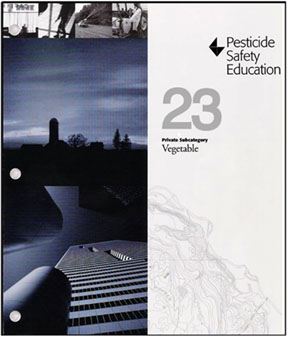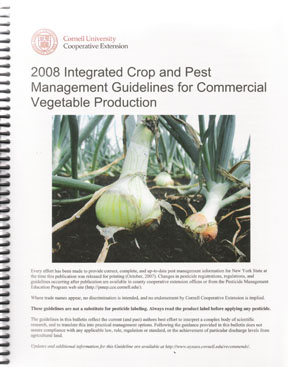Pesticide Recommendations And Staff Liability
A Guide
For many years the Pesticide Management Education Program has advised Cornell Cooperative Extension off campus staff, and faculty that pesticide recommendations are not to be made unless the recommended use of the pesticide is fully registered. If a recommendation is made that appears on the pesticide label, in the current Cornell Pest Management Recommendations series or in other publications sponsored by New York State educational and experimental institutions, you are not individually liable in the event that a problem arises because of the recommendation. If, however, you make a recommendation not specified on the label or by these agencies which is an unregistered use, you may be liable individually without indemnification by the college. If you make an unauthorized recommendation, you are on your own and may very well share liability with the one who makes the misapplication.University Counsel advises that once you are put on notice that certain activities are not authorized by Cornell, a continuation of those activities is clearly not within the scope of the employment relationship and must not continue. Furthermore, you must continue to correct the public's perception of the unauthorized recommendation so that you are not perceived as approving it by your silence.
What legally constitutes a recommendation can be a very delicate and sensitive question. Have you ever been confronted with a grower's pest problem and knew of a pesticide, even though unregistered for that particular use or crop, that would solve the problem? Have you ever told the grower that he cannot legally use the product and then proceeded to tell him how to apply it and how much to use? Would the plaintiff's lawyer in a liability case resulting from an unregistered use be able to demonstrate that this information did indeed constitute an implied recommendation? An implied recommendation of an illegal use to a grower would be doing a great disservice to agriculture, your client, and yourself. We have a responsibility to the consumer and the environment, as well as to the grower.
How should you report research results as part of your educational programs without leaving yourself open to charges of implied recommendations? What about mentioning materials being used under Special Local Need (SLN) 24(c) registrations or EPA Section 18 emergency exemptions in neighboring states that do not have New York State registrations? The following guidelines have been developed to assist you.
Guidelines
- Be sure any recommendation that you make is registered for the use as indicated
by either:
- the label, or
- Cornell Pest Management Recommendations, or similar New York State educational publications, or
- supplemental labeling as in SLN 24(c) registrations or EPA Section 18 emergency exemptions for New York State, or
- 2(ee) recommendations.
Federal and State laws make it illegal to use a pesticide "in a manner inconsistent with its labeling." Section 2(ee) of the Federal Insecticide, Fungicide, and Rodenticide Act (FIFRA), as amended, defines this term and states that certain types of use, while not specifically stated on the pesticide label, are not considered uses inconsistent with the label. These uses include:
- applying a pesticide at any dosage, concentration, or frequency less than that
specified on the labeling,
- applying a pesticide against any target pest not specified on the labeling if
the application is to the crop, animal, or site specified on the labeling,
unless the EPA Administrator has required that the labeling specifically state
that the pesticide may be used only for the pests specified on the labeling
after the EPA Administrator has determined that the use of the pesticide against
other pests would cause an unreasonable adverse effect on the environment,
- employing any method of application not prohibited by the labeling (aerial
application excluded in New York), or
- mixing a pesticide or pesticides with a fertilizer when such mixture is not prohibited by the labeling.
Individual states are allowed to be more restrictive, and New York State has determined that it is necessary to place more stringent requirements on 2(ee) uses/recommendations. Under state regulations Part 325.2(b), "registered pesticides may be used only in accordance with label directions or as modified or expanded and approved by the Department." Modifications or expansions of registered labels under 2(ee) may be made under the following conditions when used in New York State:
- All proposed recommendations must be made in writing by a recognized research
institution such as the New York State College of Agriculture and Life Sciences
at Cornell University or the New York State School of Forestry at Syracuse. You
cannot make a 2(ee) recommendation without meeting this requirement.
Furthermore, manufacturers, distributors and individual users may not make such
recommendations.
- The proposed recommendations must be submitted to the New York State Department
of Environmental Conservation (NYSDEC), through the Pesticide Management
Education Program and be accompanied by appropriate data that demonstrates the
efficacy or otherwise supports the recommendation.
- Recommendations must be approved in writing by the NYSDEC. Once approved, the
2(ee) recommendation can be included in the publications of the research
institution.
- Anyone using a pesticide under an approved 2(ee) recommendation must have the
appropriate publication with the approved 2(ee) recommendation in his/her
possession at the time of the application.
- Manufacturers proposing changes in registered labels must file for SLN registrations under Section 24(c) of FIFRA.
In the event that 2(ee) recommendations are needed but not available, you should make the need known to the Pesticide Management Education Program so that remedial action can be taken.
- If you are aware of unregistered pesticide uses within your area of
responsibility, make the positive statement that the use is unregistered and
illegal, either verbally, if you are in a face-to-face situation, or in writing,
if you are dealing through extension publications. In addition, the Pesticide
Management Education Program should be notified of such uses and your evaluation
of their need and efficacy, so that the procedure to obtain legal use can be
initiated.
- Do not accompany oral or written statements of unregistered pesticide use with
suggestions as to effectiveness, methods of application, amounts to be used,
etc. This could be construed as a tacit or implied recommendation. For example,
statements such as the following could be construed as recommendations so do not
make them:
Kill Quick is the same as Dead End but not as concentrated so you must use 3-4 qts/A but not legal because corn use is not on the label. Kill Quick is 50% the cost of the Dead End for the same amount of active ingredient.
The most effective rate tested was a 1% solution which can be made up by adding 5 tablespoons of Dean End to 5 gallons of water. Test the spray on both new and old leaves to determine any adverse effects.
Likewise, if the pesticide is registered in another state or is under an EPA Section 18 exemption or Experimental Use Permit in another state, do not imply that it might be used in New York State.
- How can you reconcile research reporting with the above guidelines? Both
research/extension faculty and CCE off campus staff constantly provide reports
of ongoing research as a necessary part of their education programs. When
meetings such as the pest management conference, weed tours, on-farm
demonstrations etc. are held, results of the promising experimental compounds or
new users or applications of already registered compounds can be legitimately
reported. However, any implication that these or other experimental results can
be immediately transposed into commercial use prior to EPA and NYSDEC
registration must be strictly avoided. In addition, be particularly careful not
to imply approval of unregistered uses in newsletters, popular articles, etc.
While there are no guarantees regarding potential liability, statements such as the following are suggested for reporting research results.
Of the test treatments, a 1% solution of Kill Quick was the most effective.
In comparative research evaluations conducted throughout the growing season, Kill Quick consistently out performed the other 4 test compounds at the 1 lb a.i./A. rate
Each situation will be different. However, it is your responsibility to evaluate and decide whether you are simply reporting research results or going further and implying a recommendation. It is also your responsibility to make the positive statement that the use is presently unregistered. To further strengthen the fact that you are reporting research results, University Counsel highly recommends the use of a disclaimer on research reports and oral presentations that prominently states "The information provided in this research report is not and should not be considered as an expressed or implied recommendation of use."
Additional Information Regarding Liability
For associated information please refer to the Category 10 Pesticide Applicator Training Manual, Demonstration and Research. See pages - for Guidelines for Cornell Cooperative Extension Off-Campus Staff Who Conduct Demonstrations or Research with Pesticide; pages - for Experimental Use Permits and pages - for Research with Pesticides Registered by EPA but Not by DEC.
DAR
8/93
Cornell University is committed to making our websites accessible to everyone, including individuals with disabilities. To report a problem or to request an accommodation to access online materials, information, resources and/or services, please contact web-accessibility@cornell.edu. In your message, include the website address or URL and the specific problems you have encountered. You will receive a reply as soon as possible.





